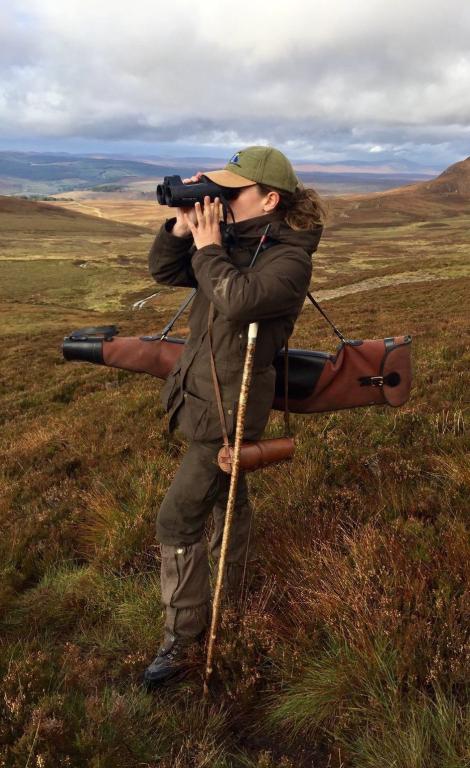Megan Rowland – breaking the mould in field sports
Female gamekeepers may have been something of a rarity in the past, but a ground-breaking trainee in the north of Scotland has her sights set on making sure things change. Because not only was Megan Rowland a winner of the Game and Wildlife category at Lantra Scotland’s Learner of the Year Awards in March, she was also the Overall Winner, and is on track to become one of Scotland’s highest achieving field sports trainees. Megan is now forging a successful career at Practical Land Management (PLM) where she works part-time as an Assistant Land Manager, and is undertaking an MSc in Countryside Management at SRUC.
Her route into a land-based career was anything but conventional, and although she has no family connections within the industry, many of her peers can boast a long line of gamekeepers, land managers, stalkers and foresters. So what sparked her interest?
“I did a lot of volunteer work with the RSPB for a couple of years, after realising the environmental sciences degree I was doing wasn’t taking me in the right direction. I wanted something with a more practical focus, so started volunteering for the Game & Wildlife Conservation Trust as well. During my time with these charities, I met farmers, crofters, foresters, gamekeepers, and they opened my eyes to the other possibilities in the rural sector. I knew from then on that I wanted to work in the great outdoors.”
Megan discovered a particular interest in deer management, despite starting out as an ‘anti-hunting’, vegetarian. She explained:
“Like many people who have preconceptions about deer management, I focused on the culling aspect of it, lumping sustainable land management in with emotive terms like “blood sports” and “trophy hunting”. When you see the bigger picture, and our role within it as ecosystem engineers and apex-predators, you appreciate culling is just one small element and a necessary aspect of land and habitat management.
“Where there are too many deer in areas of peatland or forest regeneration, there can be a damaging impact on local habitats. On the hill, the cull is focused on poorer performing individuals, which helps ensure the health and future wellbeing of the herd. During a long, hard winter, poorer quality deer could suffer and possibly die, if the population is too high. The most humane way of managing this is culling, which helps habitats whilst providing jobs and high quality, healthy food. We see deer as an asset not a problem. But they need to be managed.”
Megan moved to Dornoch in Sutherland to study at the University of the Highlands and Islands. She enrolled on the NC Gamekeeping and HNC in Wildlife Management at North Highland College UHI while working for PLM. Her time on the Gordonbush Estate has provided her with practical estate management experience, including carrying out habitat impact assessments, and learning about deer, land, forestry, peatland and river management. The HNC covered the more theoretical side of wildlife management, giving her a broad skill set from which she can choose to specialise.
Part of her role at PLM is to take guests out to cull deer, a job she relishes.
“I love interacting with clients and taking them up onto the hill once the season starts – the job is much more diverse than people expect. The stalking aspect is only a fraction of it. You need to be able to communicate effectively with others and know a lot about local habitats, wildlife, geology and the history of the area, because it’s all part of the experience we provide. It’s a great job and different every time. I love it.”
Megan doesn’t yet know where this road will lead, as she is still gaining experience in all aspects of integrated land and wildlife management. She says that she’ll choose to specialise further, once she completes her Masters.
“I love looking at the bigger picture and the fascinating interaction between different elements of land management. Everything is connected, and if you change one thing you will have an impact on another. For example, we have to look at the effect that deer can have in areas of forest regeneration, and likewise how trees can affect habitats such as peatlands and riparian environments, or be incorporated into farming. It’s often a delicate balancing act”.
Megan is not in the slightest bit fazed about her growing role within the UK’s field sports industry. She has also recently become one of only three female Approved Witnesses for Deer Management Qualifications in the UK, allowing her to mentor deer management trainees.
“As part of my work as an ambassador for the British Deer Society and as a Lantra Scotland Industry Champion, I try to actively promote our industry to all young people, male and female. There’s nothing about this career that women can’t do. I also think it’s a good thing for the industry having a diverse range of people working in it, as we all bring different skills and perspectives.
“I know many of my male colleagues would welcome more females into the industry, but I think women and girls can sometimes see it as male-dominated, and that they wouldn’t be welcome. The reality, in Scotland at least, is very different, and I hope that what I’m doing will help encourage more women of all ages to get involved.”
Megan writes about her life and work as a land and deer manager in Scotland’s countryside on Twitter as @wayfaringhind and at www.wayfaringhind.wordpress.com/blog/
